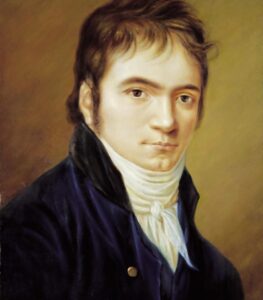Similar to the storm depicted in Mendelssohn’s Violin Concerto, Beethoven experienced an internal storm of his own while composing his Second Symphony.
He faced the biggest challenge of his life as he started to go deaf and eventually become unable to hear the music he was composing. Beethoven’s struggle to overcome his lack of hearing is illustrated by the furious virtuosic violin passages alongside the steady drumming of the low instruments.
 Beethoven’s Second Symphony is really a bridge between Beethoven’s first and third symphonies as it mirrors his personal journey while he learned to write music from his head without hearing his compositions. This work strongly contrasts his First Symphony as it’s technically beautiful and well formed, but lacks emotion. His Second Symphony also dramatically varies from Beethoven’s grand and passionate Third Symphony –his famous Eroica. However, in his Second Symphony, Beethoven explores more passionate writing while remaining technically cautious. As Beethoven’s hearing gradually disappeared, he started to rely more on instinct while writing music. One critic of the time called it “a work full of new, original ideas, of great strength, sensitive in orchestration and intellectual in concept, but one that would surely benefit from the abbreviation of some passages and the deletion of others, for the modulations are entirely too eccentric.”
Beethoven’s Second Symphony is really a bridge between Beethoven’s first and third symphonies as it mirrors his personal journey while he learned to write music from his head without hearing his compositions. This work strongly contrasts his First Symphony as it’s technically beautiful and well formed, but lacks emotion. His Second Symphony also dramatically varies from Beethoven’s grand and passionate Third Symphony –his famous Eroica. However, in his Second Symphony, Beethoven explores more passionate writing while remaining technically cautious. As Beethoven’s hearing gradually disappeared, he started to rely more on instinct while writing music. One critic of the time called it “a work full of new, original ideas, of great strength, sensitive in orchestration and intellectual in concept, but one that would surely benefit from the abbreviation of some passages and the deletion of others, for the modulations are entirely too eccentric.”
Interestingly, this ground breaking symphony is rarely performed because it’s not considered to be one of his greatest works. It’s overshadowed by more popular pieces like his Third, Fifth and Ninth Symphonies – which are regarded as some of the greatest masterpieces in the orchestral world.
But this work is just as worthy of the same high regard. Sadness, madness and inner turmoil are well depicted in Beethoven’s Second Symphony. Perhaps some of the tempestuous and thrilling melodies in this work are related to his creative process. Whenever he sat down to compose, he would pour a bucket of ice water over his head. We don’t exactly know why, but some speculate it helped him stay awake. He put exactly six coffee beans in every cup of coffee he drank, which gave him a caffeine blast during his long hours composing.
Between losing his hearing, pouring ice water on his head and large amounts of caffeine, it’s no wonder Beethoven was the mad genius he was, and wrote so many incredible works, including his Second Symphony.
Tonight, the HPO performs Beethoven’s Second Symphony in Brilliance: Mendelssohn’s Violin Concerto. Until then, here’s this unique work that reflects Beethoven’s personal journey: